The Best Books I've Read in 2015

The major themes this year were developing a strong inner compass to direct one through the world. Having a philosophy of life, can help you navigate through life's challenges with better control, awareness, and clarity of values. To prioritize you should understand the one thing you can do that makes all the difference. As you grow and develop habits, to create the person you want to be, learn to love the process and cherish the journey. Be someone who is more than resilient, but who can adapt and to chaos and change; be Antifragile. Understand that time is all you have and learn how to use it to the fullest to lead a fulfilling, happy and useful life.
These are the best books I've read this year:
A Guide To The Good Life
by William B. Irvine
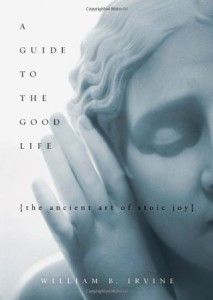
When I finished reading this book, I realized I had stumbled across something I've always been searching for, a guiding philosophy of life. Irvine gives a modern look at the ancient philosophy of Stoicism, which originated in the early 100 B. C's from the school of Greek and Roman philosopher; a model of living that has withstood the test of time.
Irvine looks at various Stoic techniques for attaining tranquility and shows how to put these techniques to work in our life. We learn how to minimize worry, how to let go of the past and focus on the things we can control, and how to deal with insults, grief, old age, and the distractions of fame and fortune.
A powerful concept to understand your Triad of Control, distinguishing between things we can control and things we can't so that we will no longer worry about the things we can't control and will instead focus our energies on the things we can control.
The book is divided into four parts, part one describes the origins of the philosophy. Part two explains the psychological techniques the Stoics developed to attain and maintain tranquility. Part three talks about what we must do in order to practice Stoicism and how to use the knowledge to deal with the stresses of everyday life. Part four looks at criticisms against Stoicism and defends it while also reevaluating Stoic psychology in the life of modern scientific findings. The author ends the book by relating the insights he has gained in his practice of Stoicism. A Guide To The Good Life shows us how to become thoughtful observers of our lives.
The Inner Game of Tennis
by W. Timothy Gallwey
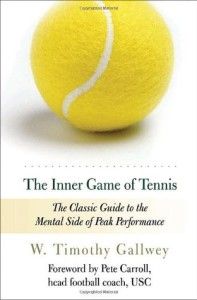
The Inner Game of tennis is about reaching a state of peak mental performance, through the art of relaxed concentration. The author talks about two states within us, Self 1, the teller and Self 2, the doer. The key is improving the relationship between the conscious teller and the natural capabilities of Self 2, enabling one to turn thoughts into fluid action.
When you attain mental peak performance, you will learn how to get the clearest possible picture of your desired outcomes, how to trust Self 2 to perform at its best and learn from both successes and failures, and how to see "non-judgmentally" - that is, to see what is happening rather than merely noticing how well or how poorly it is happening. The Inner game of Tennis uses tennis as a medium to discuss these skills.
The most indispensable tool for human beings in modern times is the ability to remain calm in the midst of rapid and unsettling changes; this is an important book to help you get there.
The Practicing Mind
by Thomas M. Sterner
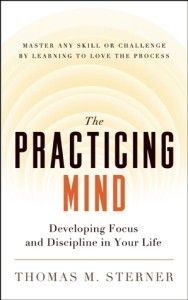
The amount of wisdom packed into this small book blew my mind. I immediately knew it was making the list only halfway through. In the practicing mind, the author emphasizes the importance of process over product and results. Most of the anxiety we experience in life, and failure to finish what we start comes from this feeling that there is a point of perfection in everything we do. Early life is all about trial-and-error practice, but modern life's technological speed, habitual multitasking, and promises of instant gratification have made us lose touch with consistent hard work and trust in the process.
By focusing on "process, not product", you'll learn to live in each moment, where you'll find calmness and equanimity. Creating the practicing mind comes down to these simple rules: keep yourself process-oriented, stay in the present, make the process the goal and use the overall goal as a rudder to steer your efforts, be deliberate, have an intention about what you want to accomplish, and remain aware of that intention.
Some of the most powerful traits you can get from being more process-oriented are becoming a more patient and disciplined individual. You'll be able to pick a goal and apply steady effort to reach it while finding love in the journey of getting there.
The One Thing
by Keller Papasan
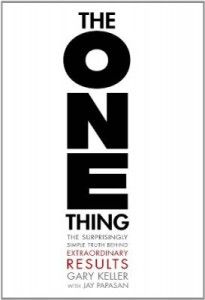
In The One Thing, you learn the art of prioritization and how to train your mind to connect one goal with the next over time until you know the most important thing to do right now. If you don't have a goal in mind, great questions are a way to get you closer, by leading you to an excellent answer. The question you can start with is the focusing question: What's the one thing I can do such that by doing it everything else will be easier or unnecessary? By finding your One thing, you can find the signal through the noise, achieve better results in less time, reduce stress by feeling less overwhelmed and more focused, better manage your energy and stay on track to finish what you've started.
Success is about doing the right thing, not about doing everything right. To get there, find your purpose by figuring out what drives you. Don't focus on being busy, focus on being productive. Go all in on what matters to you, and say no, to defend your priority, everything else can wait.
"Life isn't about finding yourself. Life is about creating yourself." - George Bernard Shaw
The Time Paradox
by Phillip Zimbardo and John Boyd
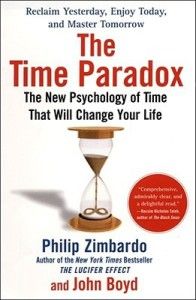
Every important decision you make is influenced by an important cognitive factor many people seem to overlook, perception of time, your internal and personal time zone. In The Time Paradox, Drs. Zimbardo and Boyd draw on over thirty years of research, teaching you about the psychology of time and how you individual time perspective shapes your life and is shaped by the world around you.
Your time perspective reflects attitudes, beliefs, and values related to time. The six-time perspectives identified are Past-negative, Past-positive, Present-Fatalistic, Present-Hedonistic, Future, and Transcendental-Future. Once you become aware of your personal time zone, you can begin to see and manage your life more mindfully, and have a better understand of other people's time orientation.
The book shows how different cultures, locations, economics and interactions with other individuals time zones can influence different time perspectives. A biased future time perspective serves people well in some situations but poorly in others. Only a balanced time perspective opens all paths to happiness. The Time Paradox gives you a practical plan for optimizing your blend of time perspectives so you will be able to overcome mental biases that keep you too attached to the past, too focused on immediate gratification, or unhealthily obsessed with future goals.
Antifragile
by Nassim Nicholas Taleb
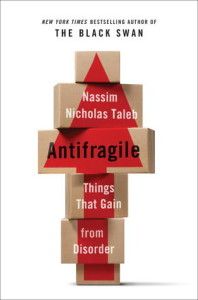
With Antifragile, Taleb gives us a roadmap for thriving in change and chaos. For something to be fragile, it cracks under stress and pressure. Something that isn't fragile but robust has a higher threshold for stresses and pressure. Taleb, presents the concept of Antifragile, something that goes beyond resiliency and can improve with added stress, difficulties, and uncertainty. A familiar example of this would be the human body, it benefits from stressors to a limit. Our bones will get stronger and denser when occasional stress is applied to them. Muscle cells break down and rebuild, and our nervous system adapt to heavier amounts of weight over time.
Taleb's states that people and institutions are either fragile, robust, or antifragile. The resilient resists shocks and stays the same; the antifragile gets better and better. Having a better understanding of this can help us better design and approach ideas, life decisions, technology, medicine, politics, war, urban planning, finance, legal, economic and other systems to protect against fragility, prediction errors and adverse events.
I should note: the book has a very philosophical and academic tone that can make it difficult to read. The book is divided into seven parts also called books, seen as stand-alone essays that support the central idea or go deeper into other areas.
Between The World And Me
by Ta-Nehisi Coates
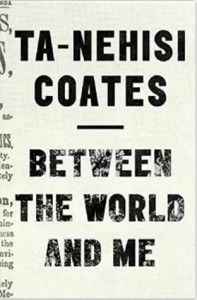
In Between the World and Me, Coates write to his fifteen-year-old son, Samori, about questions regarding the nation's history, culture, racial struggles and his experiences living in a black body in America.
Forgetting about the past and the pain that comes with it is easy, but remembering and understanding is very hard. Coates talks about 'The Dreamers', who have forgotten the origins of this country's wealth and seek to preserve themselves in this countries privileges, backed by systems that have robbed and imprisoned a generation of peoples. Growing up in the tough streets of Baltimore, Coates describes a snapshot of his environment:
"To be black in the Baltimore of my youth was to be naked before the elements of the world, before all the guns, fists, knives, crack, rape, and disease. The nakedness is not an error, nor pathology. The nakedness is the correct and intended result of policy, the predictable upshot of people forced to live under fear. The law did not protect us. And now, in your time, the law has become an excuse for stopping and frisking you, which is to say, for furthering to assault on your body." - Ta-Nehisi Coates
Throughout the rest of the book, I felt his pain and anger. I saw a man who had given up faith in beliefs of a higher faith, in a broken educational, judicial and cultural system and who saw the American Dream as a destructive illusion. I wondered to myself, what would my father write to me? I had no father to ask this advice. Raised by a single mother, who was breaking under the pressure of the world, I could not ask these questions as she always pointed me towards asking God; there was no response. If I had read this when I was Coates son's age, would I have accepted his message and done the choices I have made?
I don't agree with all of Coates points, but I respect the man and acknowledge his pain. I have personally chosen a different path, Coates, would say similar to Prince Jone's mother, but I've kicked it up a notch with more empathy, discipline, and awareness. From a young age, I've distanced myself with 'the body', lost my attachment to race and cultivated the mind. The body is still fragile, and I know it can be taken away from me. But I can't afford to hate the world, I still have something I can give to it.